Building a successful store in the e-commerce world requires a good e-commerce platform and comfort with the shop builder itself, so it should not only have the right features, but it should also be easy enough to use.
If you’re ready to dive in and start building, you’ll want to know the platform you are picking is best.
Here are our top picks for the best online store builders:
- Shopify
- Volusion
- BigCommerce
- Squarespace Commerce
- WooCommerce
- Magento
What to consider when choosing an online store builder
Certain factors are non-negotiables when it comes to top e-commerce software, and the Ascent takes into consideration certain qualities that must be met.
1. Sophisticated inventory and data tools
What you sell is what brings in your bucks, so any good online store creator should have an easy system for managing inventory, complete with essential insights and analytics.
You need to not only be able to add and update your goods for sale, but you need to have analytics that let you see what is selling and when, so you can track trends and make smart business decisions.
2. Ease of use
It shouldn't be rocket science to build your online store, so having a user-friendly interface is critical. You're likely not an IT professional, so you will want to be able to make your online store website with ease.
Whether a site builder is drag-and-drop, intuitive, or point-and-click, you should be able to navigate through the dashboard and follow the steps to build your online store without pulling out your hair.
3. Add-ons and integrations
The best software is only made better by access to different integrations and additional apps to increase its primary offerings.
From website marketing apps to form builders, sales tools, and beyond, the more (quality) integrations you have access to, the more your website store builder as a whole has the potential to be greater than the sum of its parts.
The six best online store builders for small businesses
With those three main qualities in mind, as well as others, such as the ability to help you meet marketing objectives, we’ve pulled together six of our favorite options for building your online store.
1. Shopify
If you are looking to build an online shop, you likely know of Shopify. It is an e-commerce juggernaut for a reason, having been developed for entrepreneurs who are not necessarily web designers or developers by nature. You don’t need to know how to code, as the platform lays out the building process with ease.
Shopify understands the building blocks of sales and marketing, including inventory management, product positioning, customer management, marketing, and more. There are a ton of themes to choose from so you can fully customize your business. And you don’t have to worry about hosting, as Shopify hosts for you.
You don’t even have to worry about building a store if you don't want to, as you can buy an operational, live store, and functioning business from the Shopify Exchange, if you have the funds for it.
Shopify offers necessary marketing integrations, including e-commerce email marketing and social media tie-ins so that you can have full control over and insight into the customer journey across a variety of touchpoints.
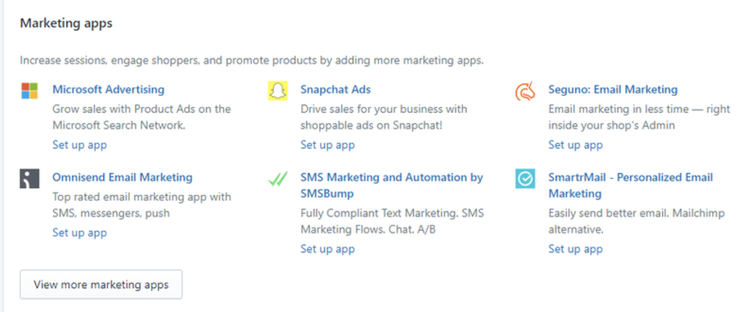
The marketing integrations with Shopify are of a high enough quality and variety to up your marketing game. Image source: Author
Shopify is affordable, too, starting at just $29 a month with access to a lot of features.
Read The Ascent’s full Shopify review
2. Volusion
Volusion started back in 1999 and has years since to perfect its offering, narrowing down its focus to doing online store building really well. It’s especially loved by medium-size businesses, as it has the sweet spot of just enough integrations, but not too many to overwhelm or drown out the main purpose.
Customization is still key, as Volusion offers themes (both for free and at an additional cost), and SEO functionality built right in, so you can create pages in an attractive and smart way.
And speaking of smart, adding and editing product pages is intuitive with a block-by-block building process that has a drag-and-drop media uploader and browseable library.

Adding products is a simple step-by-step process with Volusion. Image source: Author
The end result with Volusion is a clean, customized storefront that you can manage with ease. If you need help, the software has a full resource library, as well as representatives who are available to assist you 24/7.
Read The Ascent’s full Volusion review
3. BigCommerce
BigCommerce is, as the name would suggest, a pretty big deal. Thanks to its multitude of features and unlimited growth and flex potential, it is one of the top choices for larger businesses and enterprises. Still, it’s an excellent option for any size endeavor, as it can scale along with your store.
The sheer amount of sales and marketing analytics available means you have unparalleled insight into your business, including financial data, inventory information, client management, and much more.
Plus, you aren’t just limited to selling online on BigCommerce, as it has built-in multi-channel selling across the highest performing sales platforms.
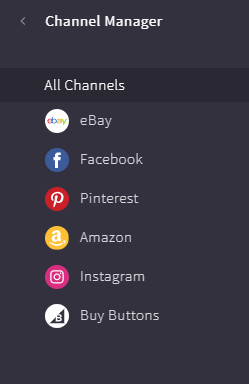
The essential sales and advertising platforms are built right into your system on BigCommerce, so you can sync up and sell in no time across multiple channels. Image source: Author
It lets you build an empire with its e-commerce store builder while still being really easy to navigate while you build. The crucial aspects of sales, such as automated tax and integrated smart shipping options, are there, too, to make it easy for you to use one of the best online storefront builders.
It also really ramps it up with security, using the Google Cloud to install multiple layers of security, along with the important SSL (Secure Sockets Layer) security certificate, so sensitive financial data is protected. And if you get stuck at any time, BigCommerce has 24/7 support you can contact.
Read The Ascent’s full BigCommerce review
4. Squarespace Commerce
With excellent support, a large user base, and a reputation for beautiful aesthetics, Squarespace Commerce has a lot of fans. Just like the regular Squarespace, this online store-builder version has a library of beautiful templates that you can use to create a super-sophisticated site.
It also makes selection easier by allowing you to narrow down your choices by industry. Whichever theme you do opt for, you are assured of being able to showcase your products in a unique, eye-catching way.
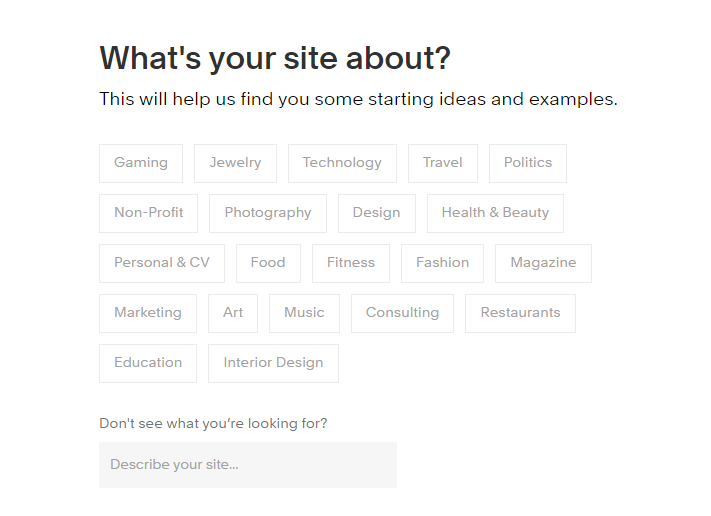
Never fear when it comes to theme selection, as Squarespace Commerce lets you search by industry. Image source: Author
There’s already a large Squarespace Commerce user base of over 14,692 businesses and growing. You can start as small or large as you like without fear because this software grows and scales with your shop.
When it comes to features, the offerings may not be as robust as some others, but they are purposeful. A lot are designed around helping you further customize your site, while there are also marketing and sales add-ons.
One of its most helpful features is the ability to automate emails along the customer purchasing process, while another integration helps you automate sales tax and associated purchasing fees.
It’s not a drag-and-drop editor, but the building is done in easy to understand steps. You have a descriptive toolbar and clean editing blocks, so using it on the back end is not a headache.
Read The Ascent’s full Squarespace Commerce review
5. WooCommerce
An offshoot of the already widely popular WordPress, WooCommerce is itself an integration of sorts, meaning you will have to have a WordPress site to use it. It is also, like WordPress, technically free, which is quite attractive.
However, there are several costs that are not necessarily hidden, but feel like they haven't been thought of.
Despite the software being free to download, keep in mind you’ll need to pay for a domain for hosting, the plugins necessary to run a store, and if you want a more customized look, possibly a theme template or a web designer.
There’s a lot of flexibility with WooCommerce by nature, so it is ideal for however small or large you’d like your business to be. And while there’s not necessarily dedicated support in the traditional sense, it has a lot of users and a big community of knowledge plus a lot of online resources.
Using WooCommerce is pretty straightforward, especially since you will already be familiar with using WordPress The fact that WooCommerce is a WordPress extension means your learning curve is super flat. When you add or edit products, it feels just like editing a regular WordPress page.
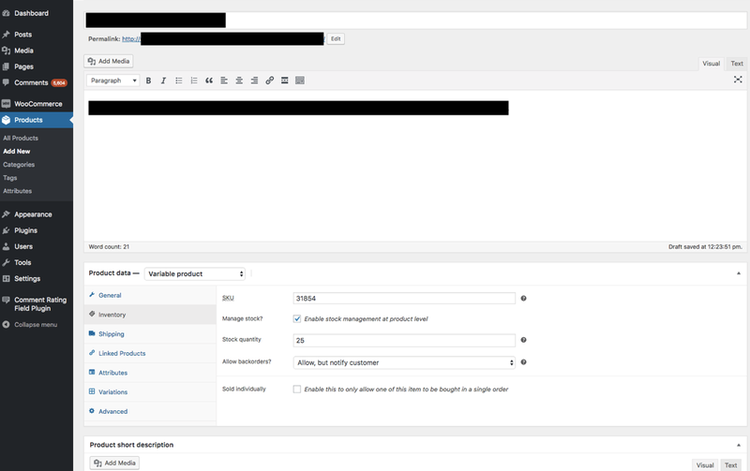
There’s no culture shock when it comes to editing in WooCommerce. Image source: Author
Because it's a part of WordPress, you get premium blogging capabilities with WooCommerce, as well as access to other plugins, including sales-focused ones such as accounting integrations and dynamic pricing.
Read The Ascent’s full WooCommerce review
6. Magento
First things first: Magento is a bit pricey. It’s geared toward medium to large businesses, all the way up to international enterprises, so it comes with a lot of features, and it definitely costs more than some of the other options. You will need to make a consultation appointment with a sales representative to get specific pricing.
If you have the budget, though, Magento (an offshoot of Adobe), comes loaded with premium and intuitive features that work equally well for B2B and B2C businesses. For starters, the customization possibilities have almost no limit.
You can select a premade theme and customize within it, or have a web developer create one for you. Once you are set up, the day-to-day management and editing aren't overwhelming, thanks to its drag-and-drop editor.
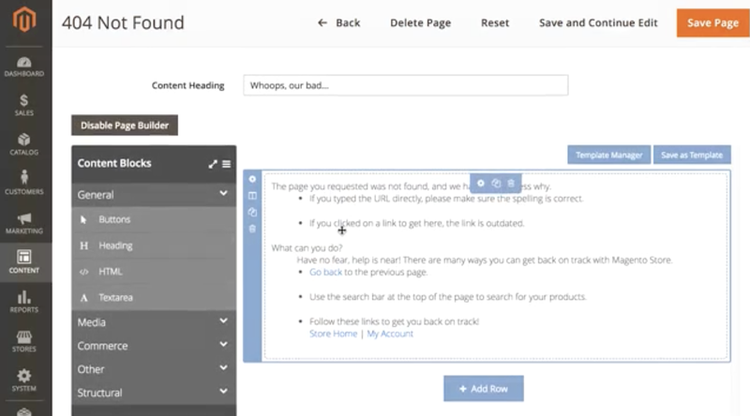
Once the back-end is set up, editing is pretty easy with Magento’s clean editor. Image source: Author
Magento also has a lot of unusual but helpful features, such as seeing how your site will look at a future date after scheduled updates and edits go into effect, setting up separate platforms for B2C sales and B2B sales, and letting B2B customers negotiate and submit bids.
Magento also has the most detailed permissions options out there for users.
Read The Ascent’s full Magento review
The online shop world is your oyster
When you are ready to conquer the e-commerce world, you have a lot of strong choices for where to build your store. From tight security to advanced features, there are a lot of online builders that can help you launch your shop and set forth.
Our Small Business Expert
We're firm believers in the Golden Rule, which is why editorial opinions are ours alone and have not been previously reviewed, approved, or endorsed by included advertisers. The Ascent does not cover all offers on the market. Editorial content from The Ascent is separate from The Motley Fool editorial content and is created by a different analyst team.